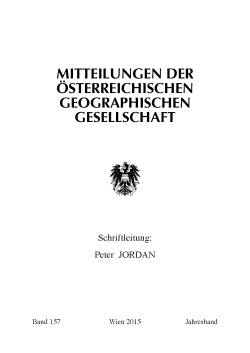
Mitteilungen der Österreichischen Geographischen Gesellschaft Band 157/2015, pp. 13-28, 2016/02/16
157. Jg. (Jahresband), Wien 2015
The EU’s enlargement of 2004 was a relevant and courageous step aiming at the creation of conditions for the promotion of security, prosperity and regional co-operation in Europe. However, after that process the European spatial development policy discourse has taken a ‘territorial’ character. The notion of territoriality and the prevalent ‘territorial’ discourse produced an evident eclipse of the notion of ‘European space’ that had been developed in the early 1990s. The same EU’s concepts of enlargement and political integration produced a sharp system of inclusion and exclusion, defined by full membership status and by fortified, scrutinised and increasingly militarised external borders. Due to this pragmatic notion of territoriality and boundaries, the idea of the EU as a ‘non-Westphalian new empire’, characterised by softening of borders and sharing of political power across multiple and multilevel politics became unrealistic, as shown by the recent migrant crisis.
Keywords: EU´s enlargement, borders, territorial cohesion, European Neighbourhood Policy, migration crisis